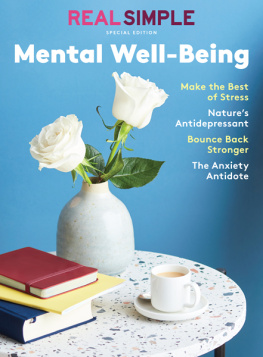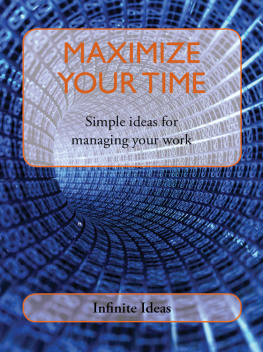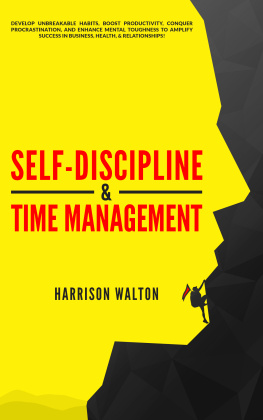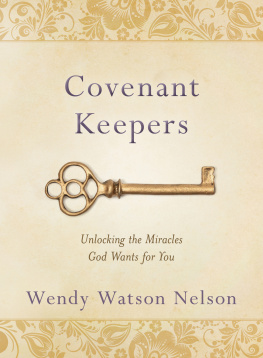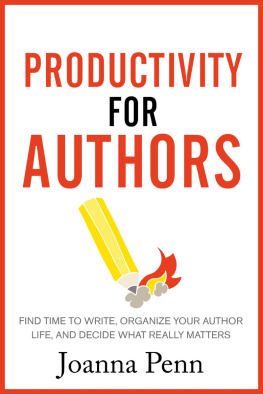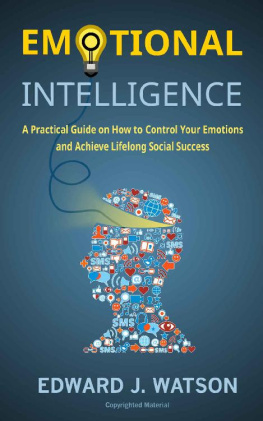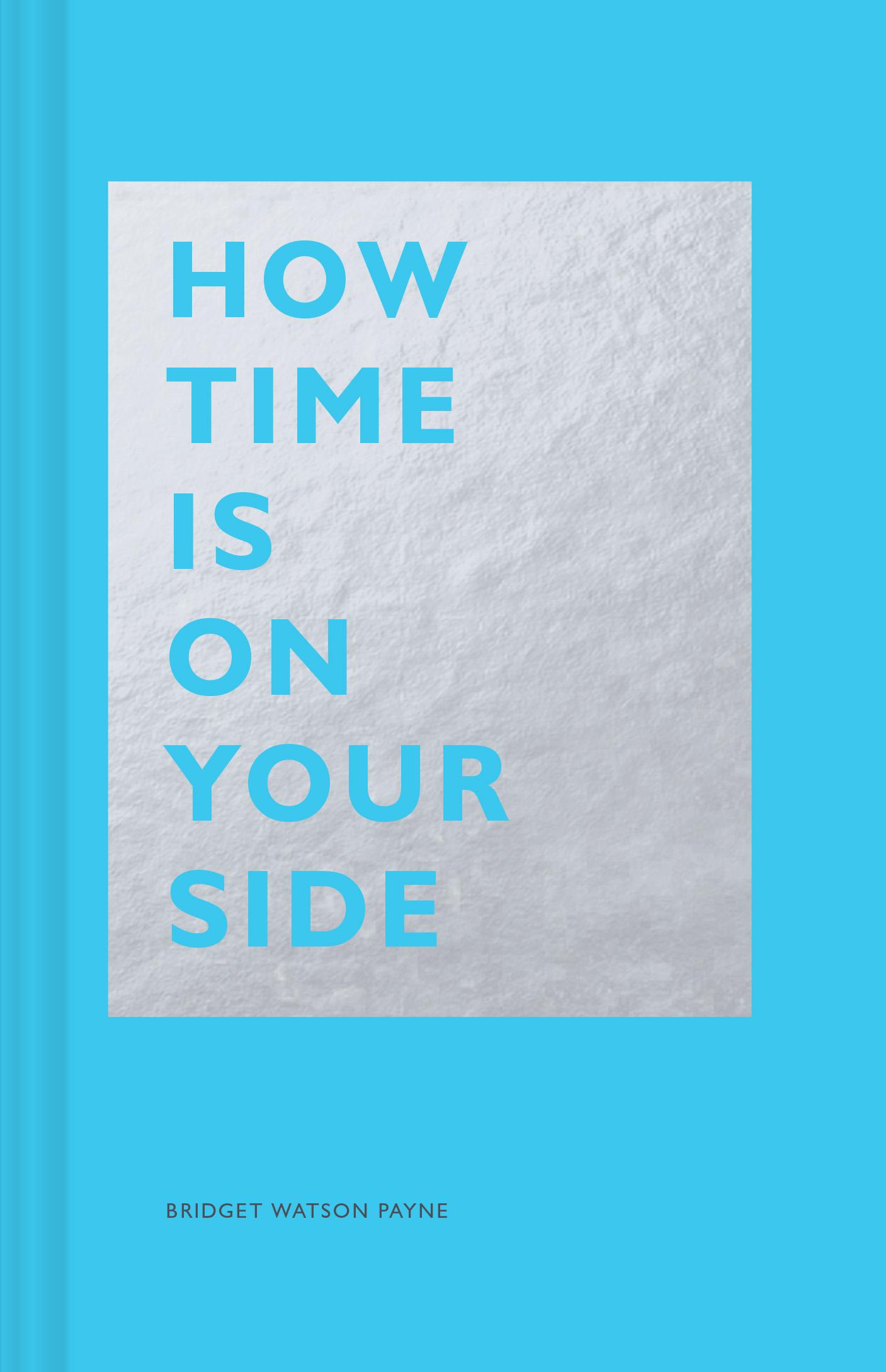


Text copyright 2020 by Bridget Watson Payne.
All rights reserved. No part of this book may be reproduced in any form without written permission from the publisher.
Library of Congress Cataloging-in-Publication Data:
Names: Payne, Bridget Watson, author.
Title: How time is on your side / by Bridget Watson Payne.
Description: San Francisco : Chronicle Books, [2020] | Includes bibliographical references.
Identifiers: LCCN 2018045081 |
ISBN 9781452171937 (hc : alk. paper); ISBN 9781452172286 (epub, mobi)
Subjects: LCSH: Time management. | TimePsychological aspects. | TimeSocial aspects.
Classification: LCC HD69.T54 P39 2019 | DDC 650.1/1dc23 LC record available at https://lccn.loc.gov/2018045081
Design by Vanessa Dina and Alma Kamal.
Chronicle books and gifts are available at special quantity discounts to corporations, professional associations, literacy programs, and other organizations. For details and discount information, please contact our premiums department at or at 1-800-759-0190.
Chronicle Books LLC
680 Second Street
San Francisco, California 94107
www.chroniclebooks.com
TIME IS YOUR FRIEND
INTRODUCTION
It is a truth universally acknowledged that no one in todays world has enough time. Everyone is too busy. Everyone is overwhelmed. No one feels theyre devoting as much time as theyd like to their careers or their friends or their partners or their families or their creative pursuits or their social conscience. Let alone their own quiet inner selves.
A million opinion pieces and life-hack books have been written about productivity, about how to get more done in the not-enough-time we have.
And then a million other think pieces have been written suggesting we basically throw productivity out the window. Replace it with mindfulness. Replace it with minimalism. Replace it with self-care. Replace it with rest. Replace it with play.
But these idealswonderful and worthy though they arein turn become just more occasions for self-loathing. Oh god, we think, now Im not playing enough, Im not meditating enough, Im not purging my closets enough, Im not taking enough bubble baths. What the hell is wrong with me?
The answer, of course, is nothing. And everything. We are all perfect exactly as we are. And, simultaneously, we are all profoundly flawed and infinitely improvable. Thats the conundrum, the essential paradox of being human. How do we accept our glorious and broken selves just as we are, while also constantly striving for the good?
The demands of life are pressing in upon us. The jobs need doing. The children need raising. The marriages need tending. The world needs saving. We need to hold ourselves, and those around us, with the same tenderness with which wed hold a tiny baby. While at the same time we need to fight for what is right with the tenacity of a full-grown adult human who isnt exhausted all the damn time.
We need to get going. We have big important things to do. And to do them we must get all the crap out of our way. Clear the underbrush. Banish the detritus. Muster our resources and get crystal clear about whats worth it and whats not. We must find the mix of practical tools and big ideas that allow us to make friends with time.
Yes, really, friends. Time, it turns out, is not actually your enemy. Its not against you. If time could want, it would probably want to be enough for you. Just like we all want to be enough. Time is there for you to make something of it. Pockets of time are hiding in the corners, waiting to be found. Tools for accessing that time are at hand.
Time, it turns out, is on your side.
Ready to find out how? Heres how.

BEFORE WE BEGIN
THE TIME PROBLEM
The world is burning. I will have those content model updates ready by Thursday.
EILEEN WEBB
Before we dive in to fixing our relationships with time, though, we need to take a close look at a couple of matters.
For one thing, we need to consider how economics and social-justice issues play into the discourse of everyone being too busy. Its never OK to just look at things from the default position of a dominant culture. We must figure out how were going to stay woke.
Second, it would help to have some background. What historical forces in the 20th century led to 21st-century people feeling the way we do? Your grandparents had plenty of challenges of their own, but a constant feeling of near panic about time was probably not one of them. What happened?
Where we are and where weve been. Whose stories get told and whose have been left out. Lets look at the cultural and historical factors at work here, before we start complaining about our in-boxes (dont worry, well get to that, too).
WERE ALL IN THE SAME BOAT AND WERE NOT ALL IN THE SAME BOAT
I think human societies tend to be problematic.
TA-NEHISI COATES
The elephant in the room when it comes to talking about timeheck, if were honest, when it comes to talking about just about anythingis privilege. Economic privilege and racial privilege and the way those two are inexorably intertwined.
Near the start of her book Overwhelmed: Work, Love, and Play When No One Has the Time, author Brigid Schulte, concerned that people think lack of time is some sort of yuppie problem, visits a group of working-poor immigrant familiesfolks working two or three jobs, living two or three families to an apartment, unable to afford childcareand asks them whether they feel they dont have enough time in their day to do all the things they need to do. Every hand in the room goes up. She asks if they have time for leisure. Everyone just stares at her. Maybe at church, one woman finally says, or when I sleep.
This story neatly makes the point that, obviously, lack of time is not just a middle-class problem. Clearly a single mom working two low-paying jobs has a greater time problem on her hands than a married middle-class mom whose husband doesnt do the laundry. Lack of time in our modern era is an everyone problem. But, like most things, its going to hit those with less privilege harder.
And while we may all be in the same boat of not having enough time, were not all in the same boat when it comes to privilege. Ta-Nehisi Coates incisively details, in his essay The Case for Reparations, how, throughout much of the 20th century, black people were shut out of one of the greatest wealth-building opportunities in American history: the middle-class home-buying boomand how that fact continues to reverberate in racial economic disparities to this day. Race and economics are irreversibly tangled, and to deny the importance of either one to peoples lived experience is to be willfully nave.
And yet, so many people still assume that the audience interested in this topic is a bougie one. Knowledge workers, creatives, freelancers, and entrepreneurs are presumed to be the readers for a book such as the one you hold in your handsand all those terms are stereotypically assumed to pertain to people who are variously privileged, relatively affluent, and probably white.



